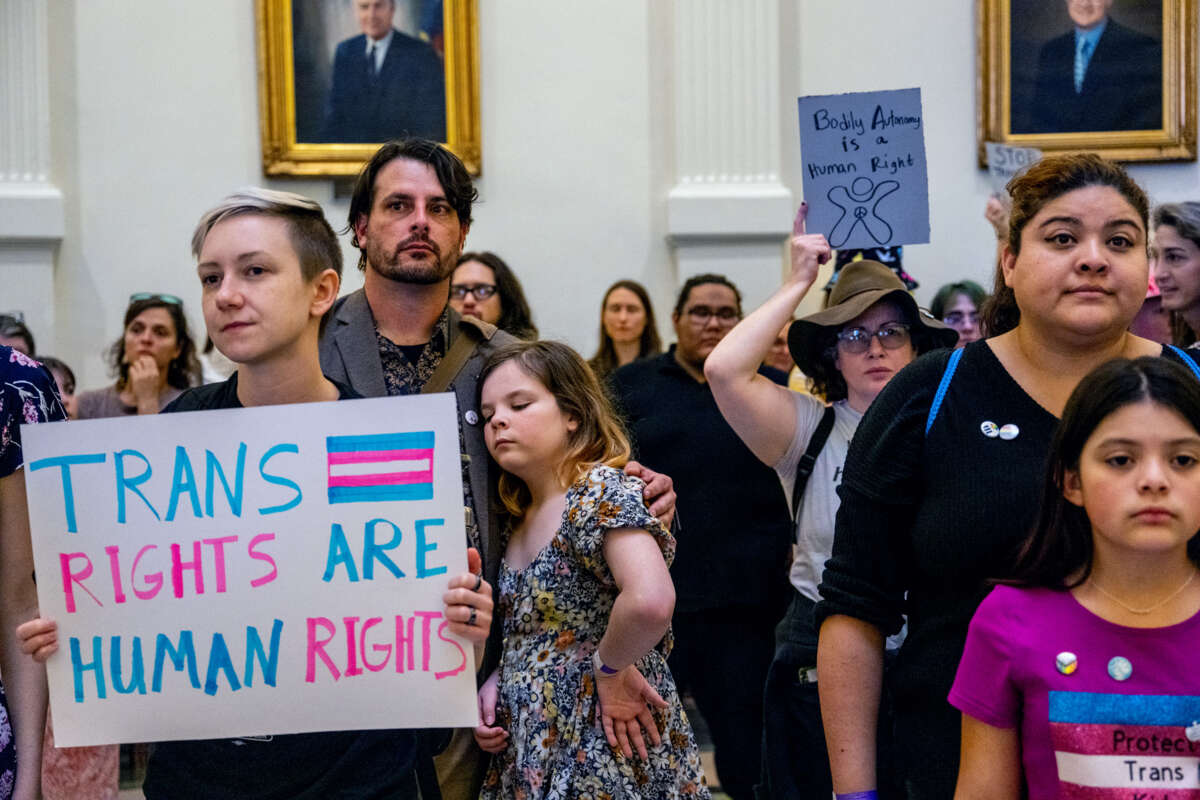Texas has become ground zero for some of the nation’s most aggressive anti-trans legislation in recent years. In 2022, Attorney General Ken Paxton launched a statewide effort targeting transgender children, threatening their parents with child abuse charges. More recently, the state began rejecting driver’s license name and gender changes for transgender individuals and compiling this information in a database. Now, one Texas city is taking things even further: Odessa, a city of 116,000, has passed a transgender bathroom ban authorizing a $10,000 bounty on any transgender person using a restroom that aligns with their gender identity.
The bounty, echoing the anti-abortion bounties seen in Texas, would be imposed on any transgender person who “enters or uses a restroom in a public building designated for the exclusive use by persons that do not correspond to his or her biological sex.” The measure further specifies that “biological sex” is determined by the individual’s original birth certificate, meaning transgender individuals with updated birth certificates are still subject to the law.
The ordinance’s enforcement mechanisms are among the most extreme of any bathroom ban in the United States. Notably, it creates a private right to sue transgender individuals found in designated bathrooms — an unusual provision for local ordinances, according to statewide advocates. City ordinances rarely authorize entirely new types of lawsuits, but in this case, such lawsuits could be used to scrutinize a transgender person’s gender identity and restroom use. If the challenger succeeds, the transgender individual would be required to pay the cisgender complainant “no less than $10,000,” with no cap on the potential bounty.
You can see the provision here:

Concerns swiftly emerged about how the ban would be enforced. Notably, unlike similar legislation in other states, Odessa’s ban lacks an exception allowing disabled individuals to be accompanied by someone of the opposite sex. Critics have also raised alarms about the potential for frivolous lawsuits clogging the courts. Cisgender people who are gender-nonconforming, for example, could face challenges and lawsuits, forcing them to prove their “biological sex” in court if they are suspected to be trans, a common occurrence with bathroom bans.
Though the bill was sold as protecting women in bathrooms from men entering such bathrooms, the bill will actually force transgender men into women’s facilities while forcing also transgender women into male facilities. One transgender man by the name of Eric brought up this point, asking the council, “Do I look trans to you?” and pointing out that one cannot always tell who is transgender.
While transgender bathroom bans targeting adults have been relatively uncommon, some advocates suggest this could signal a new wave of anti-trans legislation in 2025. Currently, only Florida and Utah have adult trans bathroom bans with explicit penalties for violations. A few other states, including North Dakota and Kansas, have similar bans but lack clear enforcement mechanisms. Odessa’s bathroom ban stands out by relying on civil action for enforcement — an approach readers may recognize from the legal strategies used to shield anti-abortion bounties from constitutional challenges.
In states that have enacted bathroom bans, enforcement has been minimal. For instance, Florida has yet to report any arrests under its criminal bathroom ban. However, by authorizing civil action with substantial potential payouts, Odessa isn’t merely banning transgender people from bathrooms — it’s incentivizing citizens to serve as enforcers, with the promise of large monetary rewards. This could lead individuals to act as “bathroom police,” patrolling restrooms to target transgender individuals, potentially turning such actions into a lucrative endeavor.
“Police or even people’s neighbors could question their sex and try to enforce this kind of ordinance, so it leads to a lot of bigotry, hatred and division,” said Brian Klosterboer from the ACLU Texas to The Texas Tribune, which first reported the law. “It ultimately will make our communities less safe because people will be policing each other.”
As the constitutionality of these laws remains contested in the courts, a Supreme Court decision on whether equal protection applies to transgender individuals looms ahead. If the ruling finds that it does not, 2025 could bring an avalanche of similar legislation, with Republican-led states and local governments emboldened to escalate restrictions.
This piece was republished with permission from Erin In The Morning.
Media that fights fascism
Truthout is funded almost entirely by readers — that’s why we can speak truth to power and cut against the mainstream narrative. But independent journalists at Truthout face mounting political repression under Trump.
We rely on your support to survive McCarthyist censorship. Please make a tax-deductible one-time or monthly donation.
